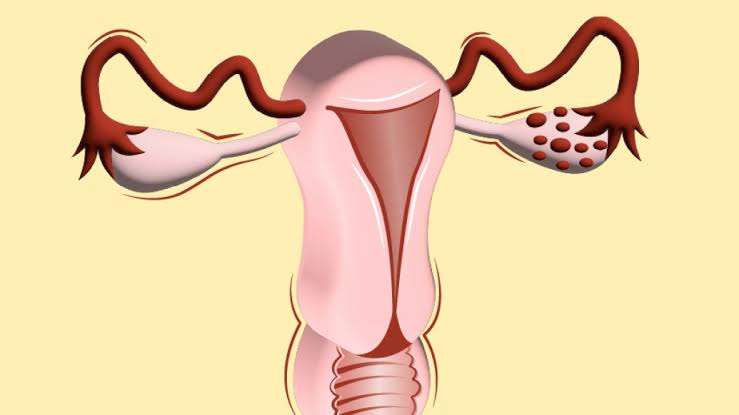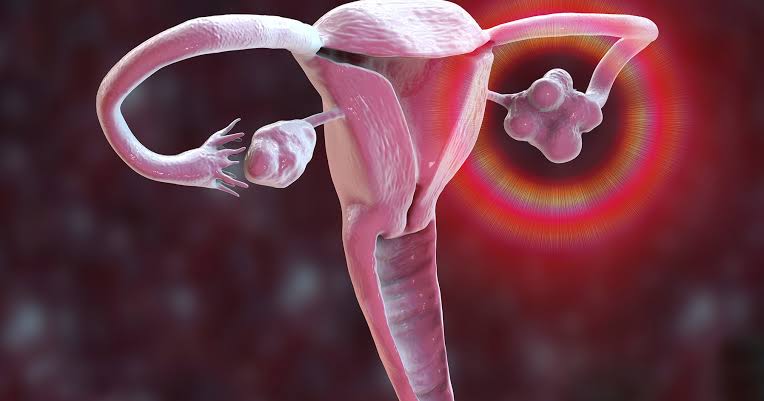Millions of women worldwide suffer from the common hormonal condition known as polycystic ovarian syndrome, or PCOS. It can be emotionally taxing and lead to a variety of health problems. The good news is that there are a number of therapy alternatives out now that can help properly manage the illness, including homeopathy.
We will examine the description, pathophysiology, types, stages, causes, risk factors, signs and symptoms, complications, investigations, dietary suggestions, and even the differential diagnosis of PCOS in this beginner’s guide. You will have a thorough understanding of PCOS and the reasons homeopathy is regarded as a therapy option by the time you finish reading this article.

Understanding PCOS
In women who are of reproductive age, polycystic ovarian syndrome, or PCOS, is a common hormonal condition that is usually diagnosed in the late teens to early 40s. The presence of ovarian cysts, or cysts, which are actually tiny, fluid-filled sacs called follicles, is what characterizes PCOS. In addition to a host of other symptoms, these cysts frequently cause irregular menstrual cycles and excessive production of androgens, or male hormones.
The Pathology of PCOS
Although the precise origin of PCOS is unknown, a complex interaction between genetic and environmental factors is thought to be involved. Insulin resistance is the first step, and it can result in elevated blood insulin levels. One factor that leads to the overproduction of androgens, including testosterone, is elevated insulin levels.
High levels of testosterone can cause the ovaries to stop working normally, which can result in irregular ovulation, the development of tiny cysts, and an imbalance in reproductive hormones.
The Types of PCOS
PCOS comes in various phenotypes, each with somewhat distinct symptoms and traits. Among them are:
1. Insulin-Resistant PCOS: This is the most prevalent kind, and it is frequently accompanied by high blood insulin levels, obesity, and insulin resistance.
2. Non-Insulin Resistant PCOS: This type of PCOS is somewhat less frequent than the insulin-resistant kind since it does not show signs of insulin resistance in women.
3. Inflammatory PCOS: A subclinical inflammatory component exists in some PCOS patients, which may be responsible for a number of symptoms.
It is important to understand that, despite the existence of these kinds, PCOS is a highly unique illness whose manifestation varies greatly across afflicted women.
The Stages of PCOS
PCOS does not always go through phases the same way as other illnesses could. Rather, with time, the symptoms and severity may change. Since the issue might cause long-term consequences, it is imperative to keep an eye on it and handle it proactively.
The Causes and Risk Factors of PCOS
Although the precise aetiology of PCOS is still unknown, a number of factors are linked to a higher chance of the disorder developing. Among them are:
– Genetics: PCOS frequently occurs in families, indicating a significant hereditary component.
– Insulin Resistance: Women with PCOS frequently have elevated insulin levels.
– Inflammation: In certain situations, persistent inflammation may play a role in the development of PCOS.
– Excess Androgens: One of the main characteristics of PCOS is elevated amounts of male hormones like testosterone.
– Obesity: A major risk factor for PCOS is being overweight or obese.
It is crucial to remember that not all women who have these risk factors will get PCOS; on the other hand, some women may still get the illness.
The Signs and Symptoms of PCOS
The symptoms of PCOS can vary from person to person and can take many different forms. Typical indications and manifestations include of:
– Irregular Menstrual Cycles: One of the main signs of PCOS is irregular menstrual cycle. Menstrual cycles in women with PCOS are frequently delayed or may not even happen.
– Hirsutism: Excessive hair growth on the face, chest, and back—areas where males usually grow hair.
– Acne: Oily skin and acne can result from elevated androgen levels.
– Hair Thinning: Some women have hair loss or thinning on their scalps.
– Weight Gain: Managing their weight is a challenge for many women with PCOS.
– Mood Disorders: An elevated risk of disorders such as anxiety and depression is linked to PCOS.
– Fertility Problems: Hormone imbalances and irregular ovulation can make conception difficult.
Complications Related to PCOS
PCOS can result in a number of issues, including:
– Infertility: It may be challenging to conceive due to the hormonal imbalances linked to PCOS.
– Type 2 Diabetes: Insulin resistance increases the risk of type 2 diabetes in women with PCOS.
– Cardiovascular Problems: High levels of testosterone and insulin can raise the risk of heart disease.
– Endometrial Cancer: A thicker uterine lining may result from irregular menstrual cycles, raising the possibility of endometrial cancer.
Differential Diagnosis for PCOS
Many disorders exhibit symptoms similar to PCOS, so a thorough diagnosis is necessary to rule out alternative causes. Among these are:
– Thyroid Disorders: PCOS symptoms can coexist with menstruation abnormalities and weight fluctuations caused by hypo- or hyperthyroidism.
– Cushing’s Syndrome: This uncommon illness can result in high cortisol levels, which can cause hirsutism and weight gain.
– Hyperprolactinemia: Excessive prolactin levels can cause galactorrhea, or the discharge of breast milk, and interfere with menstruation periods.
– Ovarian Tumors: Imaging tests should be used to rule out ovarian tumors since some of them can resemble PCOS symptoms.
Investigations for PCOS
Healthcare professionals often carry out the following investigations to identify PCOS:
– Medical History and Physical Examination: In addition to asking about your symptoms and menstrual history, your doctor will also perform a physical examination to look for physical indications of PCOS, such as acne or hirsutism.
– Blood tests: These are useful for determining hormone levels, such as those of LH, FSH, estrogen, and testosterone. PCOS is characterized by high androgen levels and an increased LH-to-FSH ratio.
– Pelvic Ultrasound: This diagnostic procedure detects the existence of cysts and aids in getting images of the ovaries.
Foods to Improve and Avoid for PCOS
Diet plays a crucial role in managing PCOS. Here are some dietary recommendations:
Foods to Improve:
1. Complex Carbohydrates: To assist balancing of blood sugar levels, choose whole grains, legumes, and vegetables.
2. Lean Proteins: These can come from fish, poultry, chicken, and plant-based proteins.
3. Healthy Fats: Include unsaturated fat sources such as nuts, avocados, and olive oil.
4. Fiber: Eating a diet rich in fiber can help control digestion and help people lose weight.
Foods to Avoid:
1. Processed Foods: Limit your intake of sugar-filled and highly processed foods.
2. Dairy: Some PCOS-affected women discover that dairy items make their symptoms worse.
3. Sugary Drinks: Consuming sugary beverages may cause an increase in blood sugar.
4. Red Meat: Steer clear of red meat as it may exacerbate inflammation.
PCOS and Homeopathy
Homeopathy is often used by PCOS-affected women as an adjunctive or alternative form of treatment. The foundation of homeopathy is the idea that a person should be treated holistically rather than only for their specific symptoms. The following are some advantages of homeopathy for those sufferering from PCOS:
1. Hormone Balancing: Homeopathic treatments are designed to address hormonal imbalances, which can help control menstrual cycles and lessen overgrowth of hair.
2. Reducing Insulin Resistance: Women with PCOS who are insulin-resistant may find that some homeopathic therapies help to increase insulin sensitivity.
3. Enhancing Mood and Overall Health: Homeopathy can help with emotional and psychological issues, which helps lessen the anxiety and despair brought on by PCOS.
4. Increasing Fertility: Homeopathic remedies are a good choice for individuals who are attempting to conceive since they can promote ovulation and increase fertility.
Homeopathic Medicines for PCOS
1. Oleum Jecoris Aselli: Beneficial for PCOS patients experiencing excessive hair growth above the chin and upper lip. Dosage: three times a day, 10 drops in half a glass of water.
2. Pulsatilla Nigricans: Beneficial for irregular menstrual cycles and amenorrhea in PCOS patients. Three pills, three times a day, is the dosage.
3. Sepia Officinalis: Treats PCOS in cases of uncomfortable and erratic menstruation. Three pills, three times a day, is the dosage.
4. Natrum Muriaticum: Good for PCOS patients with irregular or suppressed menstruation. Three pills, three times a day, is the dosage.
5. Hepar Sulph: Aids in the treatment of cystic acne and late or sparse menses. Three pills, three times a day, is the dosage.
6. Thuja Occidentalis: Beneficial in cases of PCOS involving ovarian inflammation and sparse and delayed menses. Dosage: three times a day, 10 drops in half a glass of water (tincture – 30C).
Seeking individualized counsel and treatment from a knowledgeable homeopathic practitioner is crucial. When treating PCOS, homeopathy—like any medical approach—should be utilized in addition to conventional medical care.

Conclusion: A Woman’s World!
Millions of women worldwide suffer from the complicated problem known as polycystic ovarian syndrome. Although it might be difficult to manage, many women can enjoy happy lives if they take the appropriate steps.
Incorporating homeopathy into a comprehensive therapy regimen has demonstrated potential in mitigating PCOS symptoms and associated problems. However, in order to develop a customized plan that meets your needs, it is imperative that you speak with medical specialists, including homeopathic practitioners.
Understanding PCOS and looking into alternative therapies like homeopathy is the first step toward improved health and wellness. Remember that there is hope for a better, healthier future and that you are not alone on this road.
Reach out to us for a Consultation.
This blog is for information purposes. It’s crucial to note that while homeopathy is a centuries-old practice with many adherents worldwide, always consult a qualified homeopath or medical professional before initiating any treatment.
For any queries, reach out to us at contact@homeopathic.ai





